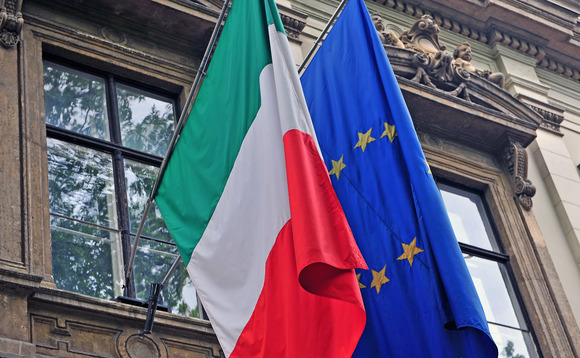
Italy's battle with EU raises risks for private equity

A stand-off between the EU and the Italian government surrounding the country's draft 2019 budget threatens to derail recent progress in the private equity landscape. Alessia Argentieri reports
Following a highly active first half of the year for Italian private equity, recent political and financial developments might lead to a far less promising last quarter and adversely affect the performance of the industry heading into 2019.
The country's economy showed unexpected stability despite the uncertainty triggered by a general election in March and the formation of a new government led by a daunting alliance of populist party Five Star Movement and its right-wing counterpart League. However, in recent weeks a fresh political earthquake has shaken the country, after the European Commission rejected the Italian government's draft budget for 2019 and Italy subsequently defied the EU's request to present a revised draft.
Instead, Rome re-submitted its initial draft budget to the Commission with the same growth and deficit assumptions as the one previously rejected for breaching EU rules. In an unprecedented situation, the Commission has now taken the first step towards sanctioning Italy and beginning the disciplinary measure known as excessive deficit procedure (EDP).
In the coming months we can expect a return of full-equity deals, both in acquisitions and capital growth operations" - Eugenio Morpurgo, Fineurop Soditic
According to EU law, the measure may result in the imposition or strengthening of sanctions including fines of 0.2% of GDP and a suspension of the payment of any development financing deployed by the European Structural and Investment Funds (ESIF). In the meantime, the Italian government's bond yields rose to a one-month high amid fears that the decision would raise borrowing costs, while the Milan stock exchange reported severe volatility.
At the time of publication, Italian media reports were suggesting that the government might be open to negotiations with the EU, but the situation remains uncertain.
"Following recent developments in the political situation and the spread increase, which always creates uncertainty about the country's stability and worries international players, we have seen investors becoming more careful, especially when buying companies deeply ingrained in the local economy," says Alessandra Piersimoni, partner and member of the private equity focus team at BonelliErede. "The same trend is noticeable on the exit side, where IPOs are perceived as not very convenient given the weakness of the market and investor confidence has lost its intensity".
On ice
The situation has already adversely affected the pipeline by putting on hold some of the largest deals that were expected to close by the end of the year. These potential transactions reportedly include the sale of BC Partners' Italian restaurant group Cigierre, which has a proposed valuation of around €750m [Editor's note: BC Partners is the majority owner of Acuris, the parent company of Unquote]. BC Partners declined to comment on the sale of Cigierre when contacted by Unquote.
In addition to the political and financial uncertainty caused by the EU's rejection, the GP's decision to suspend the sale was also influenced by a recently proposed law, expected to be approved by Italian parliament in the coming months, which would keep shopping centres closed on Sundays. This law could have a significant effect on the consumer and retail sectors and substantially reduce revenues generated by a business like Cigierre, whose restaurants are mostly located inside Italian malls.
Bought by BC Partners from L Capital and Paladin in a €300m deal inked in 2015, Cigierre has recently made two bolt-ons by acquiring eco-friendly delivery specialist Pony Zero and restaurant chain Temakinho. The company generated a turnover of around €350m in 2017 with an EBITDA margin of 10%.
Fineurop Soditic CEO Eugenio Morpurgo says: "Despite Cigierre representing an excellent asset, the Sunday closing proposal and the Italian budget rejection have created a political and financial climate that worries international investors, especially regarding the sale of a business that relies almost exclusively on the Italian market."
In addition to a period of stagnation in the industry, the country's financial instability might lead to a marked reduction in the use of leverage and favour funds that target a lower debt-to-equity ratio in their deals.
"In the coming months we can expect a return of full-equity deals, both in acquisitions and growth capital operations," says Morpurgo. "In addition, the market will likely develop a more cautious and selective attitude, especially in the large- and mid-cap spaces where deals are more frequently fuelled by international funds."
Furthermore, the financial and political climate could trigger a decrease in multiple valuations, which could shake the market but also present new opportunities.
Latest News
Stonehage Fleming raises USD 130m for largest fund to date, eyes 2024 programme
Sponsor acquired the public software group in July 2017 via the same-year vintage Partners Group Global Value 2017
Stonehage Fleming raises USD 130m for largest fund to date, eyes 2024 programme
Czech Republic-headquartered family office is targeting DACH and CEE region deals
Stonehage Fleming raises USD 130m for largest fund to date, eyes 2024 programme
Ex-Rocket Internet leader Bettina Curtze joins Swiss VC firm as partner and CFO
Stonehage Fleming raises USD 130m for largest fund to date, eyes 2024 programme
Estonia-registered VC could bolster LP base with fresh capital from funds-of-funds or pension funds









